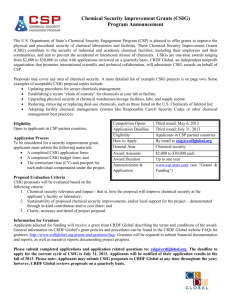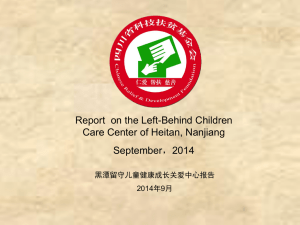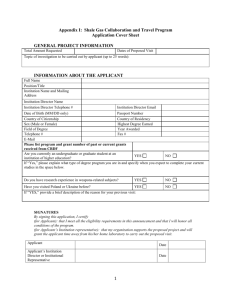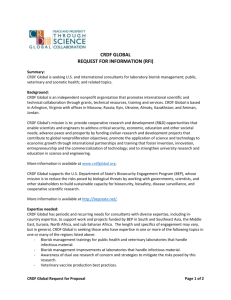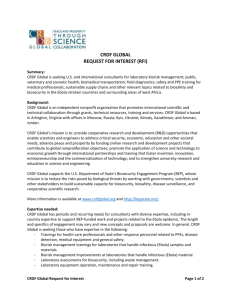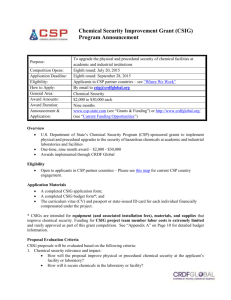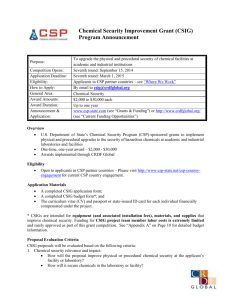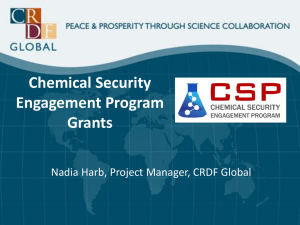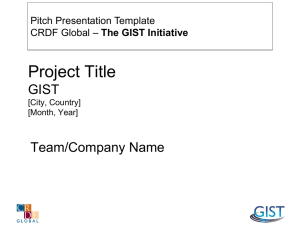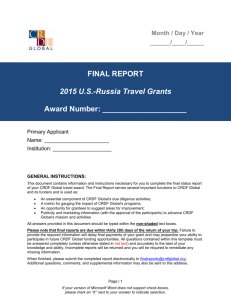Chemical Security Improvement Grants Frequently Asked Questions
advertisement
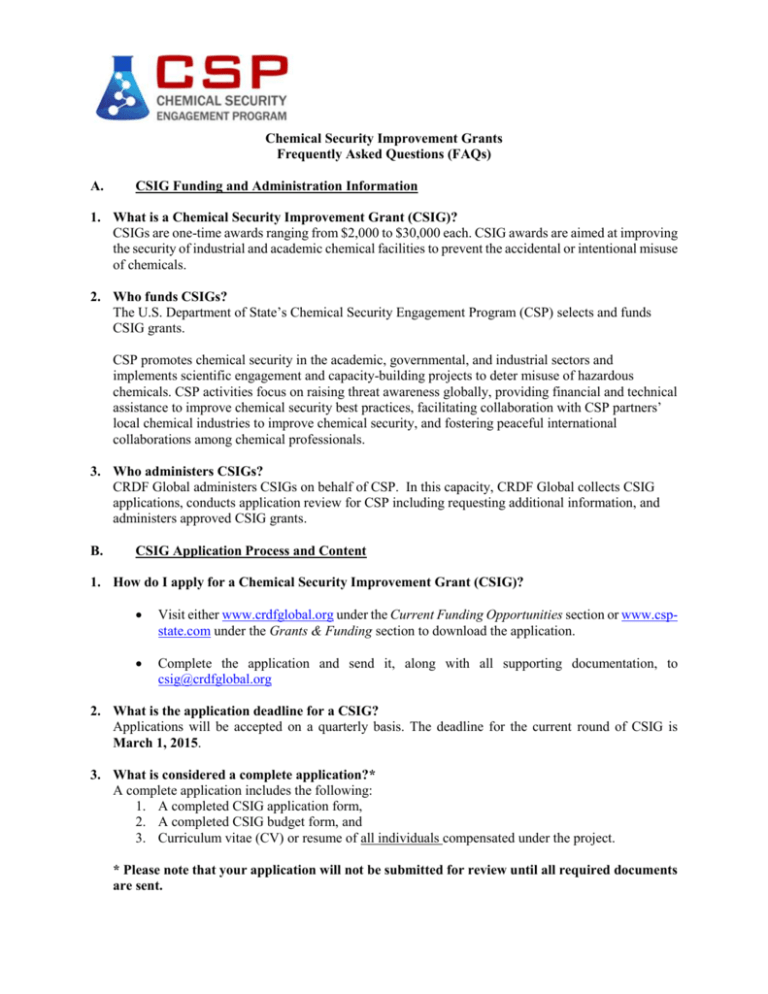
Chemical Security Improvement Grants Frequently Asked Questions (FAQs) A. CSIG Funding and Administration Information 1. What is a Chemical Security Improvement Grant (CSIG)? CSIGs are one-time awards ranging from $2,000 to $30,000 each. CSIG awards are aimed at improving the security of industrial and academic chemical facilities to prevent the accidental or intentional misuse of chemicals. 2. Who funds CSIGs? The U.S. Department of State’s Chemical Security Engagement Program (CSP) selects and funds CSIG grants. CSP promotes chemical security in the academic, governmental, and industrial sectors and implements scientific engagement and capacity-building projects to deter misuse of hazardous chemicals. CSP activities focus on raising threat awareness globally, providing financial and technical assistance to improve chemical security best practices, facilitating collaboration with CSP partners’ local chemical industries to improve chemical security, and fostering peaceful international collaborations among chemical professionals. 3. Who administers CSIGs? CRDF Global administers CSIGs on behalf of CSP. In this capacity, CRDF Global collects CSIG applications, conducts application review for CSP including requesting additional information, and administers approved CSIG grants. B. CSIG Application Process and Content 1. How do I apply for a Chemical Security Improvement Grant (CSIG)? Visit either www.crdfglobal.org under the Current Funding Opportunities section or www.cspstate.com under the Grants & Funding section to download the application. Complete the application and send it, along with all supporting documentation, to csig@crdfglobal.org 2. What is the application deadline for a CSIG? Applications will be accepted on a quarterly basis. The deadline for the current round of CSIG is March 1, 2015. 3. What is considered a complete application?* A complete application includes the following: 1. A completed CSIG application form, 2. A completed CSIG budget form, and 3. Curriculum vitae (CV) or resume of all individuals compensated under the project. * Please note that your application will not be submitted for review until all required documents are sent. 4. Should the project focus on chemical safety, chemical security or both? Each application will be evaluated on its contribution to chemical security and how it will enhance the chemical security of your institution and community. Applications focusing on chemical safety components will not be considered for funding. The project’s contribution to chemical security will be the primary consideration. 5. What is the difference between chemical safety and chemical security? Chemical Security – refers to reducing the potential for hazardous or toxic chemicals to be stolen or misused in order to harm people (i.e., reducing theft or misuse of combustibles, compressed gases, flammables, or unstable chemicals, etc.). In particular, CSP is interested in securing chemicals listed on the OPCW schedules I, II, and III from theft and intentional misuse. Chemical Safety – refers to protecting individuals from health hazards associated with the use of chemicals. For example, protecting laboratory personnel by utilizing personal protective equipment (goggles, proper ventilation, gloves, etc.). 6. Can applicants request funding for items not mentioned in the CSIG application? We welcome your creative ideas for proposals aimed at improving chemical security at your institution. 7. What should the length of my CSIG project be? The general length of a CSIG project is as follows: 6-8 weeks: grant processing and obtaining vendor price quotations for approved equipment. 8-12 weeks: equipment procurement – including purchase, delivery and installation 4 weeks: equipment testing, use and final reporting Please note that this is an estimated timeline and project length may vary depending on the scope of the project. 8. Can I request more than $30,000 in funding? Funding for any individual CSIG will not exceed $30,000. CSP may consider proposals that exceed $30,000 on a case by case basis. However, CSP reserves the right to remove line items at its discretion to achieve a budget that is in line with the CSIG granting mechanism. 9. How will my proposal be evaluated? CSIG proposals will be evaluated based on the following criteria: 1. Chemical security relevance and impact; 2. Clarity, accuracy and detail of project proposal; and 3. Sustainability of proposed chemical security improvements, and/or local support for the project. This can be demonstrated through in-kind cost share as well as through a detailed plan to maintain the project’s impact (i.e. equipment maintenance) over an extended period of time. C. CSIG Application Review Process 1. How long does the entire application process take? Upon the closing of the application period, your application is considered and reviewed. It may take 6-8 weeks to receive a final funding decision. If your CSIG proposal is approved, it may take up to another 6-8 weeks to complete the grant paperwork. *Please estimate that it will take at least four months before you may begin conducting your project, if approved. This process can be expedited by submitting a complete and accurate application as well as by responding to CRDF Global emails and submitting all required documentation as soon as possible. 2. Where does my application go after submission to csig@crdfglobal.org? Your application goes to CRDF Global, where it is reviewed for completeness. If your application is complete and contains all required supporting documentation, CRDF Global submits it to CSP for a preliminary decision. 3. What are the steps in the application review and decision process? 1. After submitting your application, CRDF Global will notify you of receipt within one business day. 2. CRDF Global will review the application to ensure it is complete and contains all required documentation. 3. If necessary, CRDF Global will contact you to request missing information or documentation. When all required information and documentation is received, CRDF Global will forward the complete application to CSP for funding consideration. 4. CSP will review the completed application and notify CRDF global of their funding decision. a. If CSP requires any additional information, CRDF Global will contact you to acquire this information. CSP will then notify CRDF Global of their final decision. 5. CRDF Global will notify you of CSP’s funding decision. *To ensure the expedient processing and review of your CSIG application, please submit an application with all sections complete and provide the requested supporting documentation with your application. 4. Why was my application not approved for funding? Can I re-apply for a CSIG? What can I do to make my application more competitive? Unfortunately, there are limited funds available for all CSP grants and not all applications can be supported, making this a competitive process. We encourage you to re-apply for a CSIG during the next open round. The following suggestions will make your proposal more competitive: 1. Emphasizing the chemical security relevance of your project. The project’s contribution to enhancing chemical security at your institution and within your community will be the primary consideration of your application. While completing your proposal, please keep in mind the difference between chemical safety and chemical security as outlined above. 2. Clearly outlining the sustainability and feasibility of your project. Do you have institutional support? How will this project be maintained over a sustained period of time and have a lasting impact on the chemical security of your institution? 3. Submit a complete and coherent proposal that has clearly answered all questions/sections and provide all requested documentation. D. Grant Implementation Equipment Requests and Purchases 1. Can I begin to incur costs as soon as CRDF Global informs me that my application was approved? No, applicants should not incur any costs without a formal CRDF Global grant agreement. After signing a formal grant agreement a CRDF Global representative will notify you that you are authorized to begin incurring costs. 2. How do I purchase chemical security equipment and supplies? There are two mechanisms by which Grantees can obtain equipment and supplies: 1. CRDF Global prefers to procure equipment and supplies on behalf of the Grantee from incountry and foreign vendors. 2. With prior approval from the CRDF Global, the Grantee can purchase equipment and supplies directly and receive a reimbursement for the associated costs. 3. How does the direct procurement process work? Grantees should first contact the vendor to discuss the technical specifications of their order and obtain a quotation, pro-forma invoice or invoice from the vendor company (consistent with competitive vendor selection guidelines – see question # 4 below). Grantees should then submit the request along with the selected quotation to CRDF Global. CRDF Global representatives will review the purchase request and upon approval contact the vendor company to negotiate the terms of a formal Purchase Order including payment arrangements, delivery dates, etc. Grantees are not authorized to negotiate contractual or payment terms with vendors or instruct a vendor to ship an item without CRDF Global approval. Only a duly authorized CRDF Global Grant Representative may negotiate binding contract terms with selected vendors. 4. How long does it take to process a direct procurement request? Orders are generally placed with the vendor within 2-4 weeks of the request, depending on the responsiveness of the vendor. Then, it depends on the lead time required by the vendor to produce/collect/deliver the requested items. If equipment is being imported into the country, additional time will need to be factored in for export compliance review, shipment and customs clearance. 5. What are the rules relating to competitive vendor selection? It is incumbent on all Grantees to seek out the best supplier for any required goods and/or services regardless of the value of the procurement. For all purchases with an aggregate cost of $5000 or more, competitive bidding is mandatory. Grantees must solicit bids from a minimum of three suppliers. Grantees should select the bid that provides the best value for the project funds. Generally, this means the lowest cost offer that also sufficiently meets the technical requirements. CRDF Global reserves the right to review the Grantee's selection and select an alternative vendor. 6. What if I am unable to identify three potential suppliers? Grantees are required to make best efforts to identify a minimum of three potential suppliers. If only two potential suppliers can be identified, then two bids are sufficient support for documenting compliance with the competitive vendor selection guidelines. If only one source can be identified, the grantee must provide a separate written "Sole Source Justification" describing the process used to identify the potential supplier and providing the justification why only a single source could be identified. Acceptable sole source justifications include: Only one supplier responded to the request for a quotation Only one supplier is able to meet the technical specifications The requested goods/services are unique and there are no other known suppliers Cost Sharing 1. I am planning to combine funds from my CSIG project with funds from another source to purchase a large piece of equipment. Do CRDF Global rules apply? Yes. If CRDF Global funds are to be used in the transaction, in whole or in part, CRDF Global rules will apply. Reporting Requirements 1. Will I be required to submit any reports to CRDF Global? The Grantee will be required to submit financial documentation and reports as well as narrative reports documenting project progress. The number of reports to be submitted will be dependent on the length of the project. Upon award CRDF Global will provide the Grantee with templates for the financial and narrative reports. Inquiries 1. To whom should I address any additional questions I have regarding CSIG? Please send any questions you have regarding CSIG to csig@crdfglobal.org and the CRDF Global team will address them as soon as possible.
